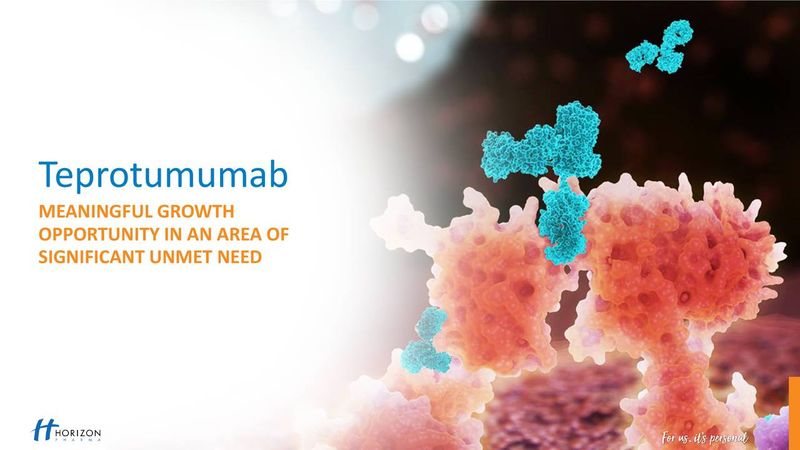FDA Advisory Committee Votes Unanimously to Support the Use of Teprotumumab for the Treatment of Thyroid Eye Disease (TED)

DUBLIN--(BUSINESS WIRE)--Dec. 13, 2019 -- Horizon Therapeutics plc (Nasdaq: HZNP) today announced that the Dermatologic and Ophthalmic Drugs Advisory Committee (DODAC) of the U.S. Food and Drug Administration (FDA) voted unanimously that the potential benefits of teprotumumab, a fully human monoclonal antibody (mAb), outweigh the potential risks for the treatment of Thyroid Eye Disease (TED).
TED is a rare, serious, progressive and vision-threatening autoimmune disease, and is associated with proptosis (eye bulging), diplopia (double vision), blurred vision, pain and facial disfigurement that can significantly impact patients’ quality of life. If approved, teprotumumab would be the first FDA-approved medicine for TED. Teprotumumab is an investigational medicine and its safety and efficacy have not been established.
“Today’s unanimously positive vote marks a significant step towards the first FDA-approved treatment for patients with TED, a vision-threatening autoimmune disease,” said Timothy Walbert, chairman, president and chief executive officer, Horizon. “Our comprehensive set of data presented today on teprotumumab’s efficacy and safety is a testament to the extraordinary efforts of the physicians who partnered with us on the clinical development program, the TED patients who enrolled in our studies, and Horizon’s research and development team. We believe that teprotumumab has the potential to address a significant unmet need for these patients and we look forward to working with the FDA as it completes its review of our application.”
“TED can affect patients both physically and emotionally, limiting their ability to perform everyday activities like driving, working, reading, sleeping and participating in social activities,” said Jeff Todd, president and chief executive officer, Prevent Blindness. “As an organization dedicated to helping patients with vision impairment, and those who are at significant risk, we are extremely encouraged by today’s vote and hopeful this will change the future of TED treatment by giving patients an option that has been shown to improve the painful and vision-threatening aspects of the disease.”
The FDA is currently evaluating a Biologics License Application (BLA) for teprotumumab for the treatment of TED. Teprotumumab is one of less than five medicines ever to receive Priority Review, Orphan Drug, Fast Track and Breakthrough Therapy designations from the FDA. The Prescription Drug User Fee Act (PDUFA) action date is March 8, 2020. The FDA will consider today’s vote as it reviews the BLA, although it is not obligated to follow the Committee’s recommendation.
The efficacy and safety of teprotumumab for the treatment of TED is supported by a robust body of clinical evidence. The BLA submission is based on positive results from the Phase 3 confirmatory clinical trial, called OPTIC (Treatment of Graves’ Orbitopathy (Thyroid Eye Disease) to Reduce Proptosis with Teprotumumab Infusions in a Randomized, Placebo-Controlled, Clinical Study), as well as positive Phase 2 results.
The OPTIC study found that significantly more patients treated with teprotumumab had a meaningful improvement in proptosis, or bulging of the eye, as compared with placebo (82.9% of teprotumumab patients compared to 9.5% of placebo patients). These results were achieved within a six-month course of therapy. All secondary endpoints were also met, including reduced diplopia (double vision), improved quality of life (QoL) and reductions in Clinical Activity Score (CAS), which measures the degree of inflammation, including pain, swelling and redness. As previously reported, the majority of adverse events experienced with teprotumumab treatment were graded as mild to moderate and were managed in the trials, with few discontinuations.
The OPTIC study was initiated after the Phase 2 study demonstrated clinically meaningful and highly statistically significant results in reducing proptosis and in the symptoms of TED as measured by Overall Treatment Response. The Phase 2 study was published in The New England Journal of Medicine in May 2017. The Phase 2 and Phase 3 studies form a robust body of clinical evidence on the use of teprotumumab in people living with TED.
About Thyroid Eye Disease
Thyroid Eye Disease (TED) is a serious, progressive and vision-threatening autoimmune disease with a limited window of activity that can last up to three years.1,2,3 While TED often occurs in people living with hyperthyroidism or Graves’ disease, it is a distinct disease that is caused by autoantibodies activating an IGF-1R-mediated signaling complex on cells within the orbit.4,5 This leads to a cascade of negative effects, which may cause long-term, irreversible damage. Active TED lasts for up to three years and is characterized by inflammation and tissue expansion behind the eye.1,6 As TED progresses, it causes serious damage – including proptosis (eye bulging), strabismus (misalignment of the eyes) and diplopia (double vision) – and in some cases can lead to blindness.2,7 TED has only been shown to respond to pharmacotherapy while the disease is active and inflammation is ongoing.8 Currently, patients must live with active TED until the inflammation subsides, after which they are often left with permanent and vision-impairing consequences.1,6
About Teprotumumab
Teprotumumab is a fully human monoclonal antibody (mAb) and a targeted inhibitor of the insulin-like growth factor 1 receptor (IGF-1R). Teprotumumab has received Priority Review, Orphan Drug, Fast Track and Breakthrough Therapy designations from the FDA. The clinical development program for teprotumumab in the treatment of TED includes positive results from the Phase 2 clinical study, which were published in The New England Journal of Medicine, as well as positive results from the Phase 3 OPTIC confirmatory clinical trial. The [Phase 3 OPTIC confirmatory trial was conducted at leading centers in the U.S., Germany and Italy, with co-principal investigators Raymond Douglas, M.D., Ph.D., Cedars-Sinai Medical Center and George Kahaly, M.D., Ph.D., Johannes Gutenberg University Medical Center. Horizon is also conducting the OPTIC‐X extension trial to gather further insight into the long-term efficacy and safety of teprotumumab. (Article from : www.drugs.com)

